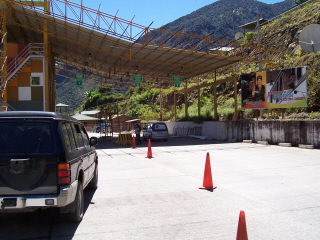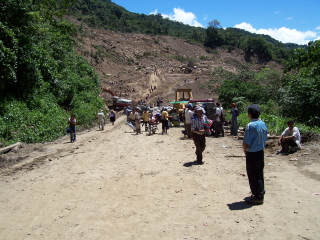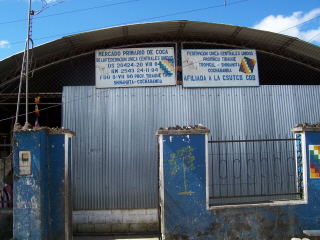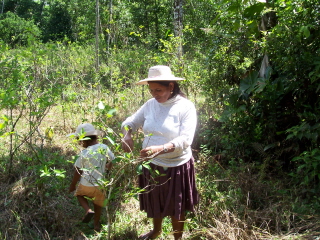many pictures from the Chapare...
 US-funded FELCN (Special Force for the Struggle Against Narcotics) checkpoint between Cochabamba and Chapare, search being conducted for cocaine and precursors
US-funded FELCN (Special Force for the Struggle Against Narcotics) checkpoint between Cochabamba and Chapare, search being conducted for cocaine and precursors
 Site of major landslide produced by massive rainstorms. Buses and trucks by the dozens were backed up here. We had to leave the jeep on the near side, walk across the landslide, hire motorcyclists to carry us about a mile to where taxis were waiting, then hire a taxi for the afternoon in the Chapare.
Click the "read full post" link or here for 20 more pictures chronicling Phil's visit to the Chapare coca-growing region.
Site of major landslide produced by massive rainstorms. Buses and trucks by the dozens were backed up here. We had to leave the jeep on the near side, walk across the landslide, hire motorcyclists to carry us about a mile to where taxis were waiting, then hire a taxi for the afternoon in the Chapare.
Click the "read full post" link or here for 20 more pictures chronicling Phil's visit to the Chapare coca-growing region.Vermont Mayor Says Execute Drug Dealers, Legalize Marijuana
The increasingly obvious failure of the drug war is spawning some odd discussions this year. There's Joe Biden and Dan Burton calling for biological warfare in South America. There's a crazy former DEA agent promising a one-year turnaround if we bust all the "druggies" and force them to stop partying. Lou Dobbs is really frustrated too, and someone should talk to him before he starts racially profiling people and asking for consent to search.
But the prize might go to Barre, VT Mayor Thomas Lauzon who wants to try some of everything. From The Times Argus:
Expect to hear plenty more crazy talk of executing drug dealers and such this year. And don't be surprised to see more politicians calling for marijuana policy reform. The failure of the drug war is all around us and people are talking about it, for better or worse.
The drug war isnât going to start working one day. Inevitably, the road to reform will be paved with crazy idiots. If they want to legalize marijuana and execute crack dealers, we'll help with the former and talk them out of killing people later.
But the prize might go to Barre, VT Mayor Thomas Lauzon who wants to try some of everything. From The Times Argus:
BARRE â Mayor Thomas Lauzon on Saturday said he hoped the Legislature would consider imposing the death penalty on convicted crack and heroin dealers, and to legalize marijuana.Sounds like an episode of South Park. If the citizens of Vermont indulge him, this could be a highly entertaining public forum. For my money, Vermont is much more likely to legalize marijuana than execute anyone (they havenât imposed the death penalty in 50 years).
Failing that, the mayor said, he would call for a public forum in Barre to kick off a statewide discussion about the growing drug problem in Vermont and steps â including the death penalty and legalization â to control the situation.
Expect to hear plenty more crazy talk of executing drug dealers and such this year. And don't be surprised to see more politicians calling for marijuana policy reform. The failure of the drug war is all around us and people are talking about it, for better or worse.
The drug war isnât going to start working one day. Inevitably, the road to reform will be paved with crazy idiots. If they want to legalize marijuana and execute crack dealers, we'll help with the former and talk them out of killing people later.
Back from the Chapare
I'm now back from the coca producing region of the Chapare. Yesterday was a real grind: Get up very early, fly from La Paz to Cochabamba, take a taxi to the Andean Information Network office where I met up with AIN's Kathryn Ledebur and her husband, former Chapare human rights ombudsman ("defensor del pueblo) Gotofredo Reinecke, hopped in his jeep with him, stopped for gas and coca leaves (it's a tiring journey), then drove about two hours over an 11,000-foot mountain pass and down into the jungly Chapare.
But first, we had to traverse a major landslide on the highway caused by incessant rains. (We were extremely fortunate to have a mostly sunny day, a rarity this rainy season). At the landslide, buses and cargo trucks were backed up by the dozens, as they had been for days. The smell of rotting fruit in the trucks was pervasive. Bus passengers had to gather their bags and make a mile-long trek over a muddy path to get to buses waiting on the other side, but we left the jeep on the near side and walked right down the roadway itselfâa shortcutâafter Godofredo explained to the soldiers that I was a photojournalist shooting the "derrumbe." My sandals, socks, and jeans were covered with mud (which made quite an impression at the Cochabamba airport this morning). Once across the washed out area, it was onto the backs of small motorcycles for hire for another half-mile to where the buses and taxis were waiting for travelers trying to continue their journey, and then we hired a taxi for the tour of the Chapare.
In the miserably hot and humid lowlands, we stopped for lunch, where Godofredo spotted veteran newspaper vendor and scene-observer Don Jaime Balderrama, with whom we had an interesting chat. Then it was on to the local military base for a talk with the comandante, which proved absolutely fruitless. He refused to say a word of substance, saying it all had to be cleared with the military high command. Sadly, this seems to be the attitude throughout the Morales government when it comes to coca matters, and as a result, I am not making much progress in getting interviews with government officials (although I still have some feelers out and some hopes, fading as they may be). The army fort, bought and paid for by US tax dollars was nicely constructed, and the colonel's office featured the only air conditioning I ran across on the whole trip. Sweet for him. Sweet for us, too. I didnât want to leave, even though we were getting nothing from him.
Then it was on to visit Vitalia Merida, a former coca grower union leader (and current member), who has a coca field way out in the middle of nowhere. After her family suffered during the repression of the forced eradication years, she now reports that there is peace, if not prosperity. I'll be writing about what she had to say in a feature article this week. I have to say that is was an absolutely brutal hike in the mid-day sun to her coca patch. When I complained, Vitalia said, "You see how we suffer," although she sweated not a drop.
Next was Shinahota, a small town that was the center of the Chapare cocaine economy during the Wild West days of the "cocaine coup" back in the early 1980s. Main street there features a bunch of two-story buildings erected at that time. Downstairs you bought cocaine, guns, and luxury items; upstairs you rented prostitutes. It's much quieter these days, and much less profitable.
Just outside Shinahota, we stopped at a coca leaf warehouse operated by the local growers' union and had a nice chat with some Six Federation leaders who, sadly, were camera shy, and just a little bit suspicious of this wild-looking gringo. (I was indeed wild-looking by then: mud-splattered, sweat-drenched, my hair blown into knots as I hung my head out the window of the taxi seeking relief). We had an interesting conversation, though, and I will report on that in the Chronicle, too.
Between Shinahota and Villa Tunari, we stopped briefly at a new coca leaf processing plant, which is being financed by Venezuelan President Hugo Chavez. He has promised to import coca products to Venezuela, which would violate the UN Single Convention, but as AIN's Kathy Ledebur noted, "Who's going to stop him?" No one there but construction workers, though. Shortly past the new coca plant, in Villa Tunari, is a municipal hospital staffed primarily by dozens of Cuban doctors and nurses. I couldnât help but compare and contrast: The US builds forts and supplies the military, Venezuela helps Bolivia industrialize coca, and the Cubans heal the sick. So it goes.
That's my report for today. I now have in essence a day and half left in Bolivia. I'm attempting to line up some last interviews, but I'm a little depressed by my lack of success with government functionaries, and just bad luck with some other people I hoped to talk to. But I still have 36 hours...
More pictures will be posted here later today.
 |
|
 |
|
Substance Abuse Recovery Alliance: General Membership Meeting
Please come and find out what we have been working on, and our proposed direction for the future. You will be able to meet the Board members. We will be discussing our mission statement, purpose, and future sub-committees.
Party with Tommy Chong & Help Ed Rosenthal
Dear Friend,
I would like to invite you to come join Tommy Chong and myself at my home in Oakland, CA for a great party to raise money for my defense fund. The party will celebrate how far we've come in legalizing Medical Marijuana as well as provide me with the money I need to fund my current trial that is defending all of our rights. Come out for some great food, groovy music and a great time.